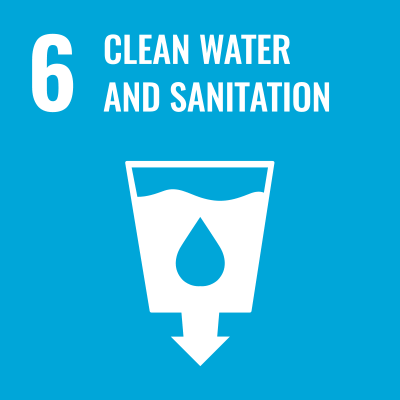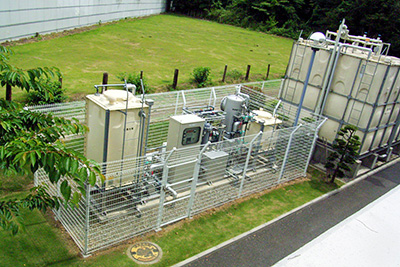Contributing to the Supply of Purified Water for Disasters and Developing Countries with the Decentralized Water Treatment & Supply System
Mitsubishi Chemical Corporation

Relevant SDG
SDG 6: Ensure availability and sustainable management of water and sanitation for all
Safe Water for the World
While approximately 70% of the Earth’s surface is ocean, fresh water accounts for just 2.5% of all water on the planet. Most of this fresh water is in glaciers and ice sheets, groundwater or otherwise difficult to access; readily available surface water* in such forms as lakes and streams is estimated to make up just 0.01% of all water on Earth.
Furthermore, this readily usable water is unevenly distributed. According to the report on “Progress on household drinking water, sanitation and hygiene 2000–2022” published in July 2023 by the World Health Organization (WHO) and United Nations Children’s Fund (UNICEF) Joint Monitoring Programme for Water Supply, Sanitation and Hygiene, some 2.2 billion people around the world (one in four) do not have safely managed drinking water services in their households and some 3.4 billion people (two in five) do not have safely managed sanitation facilities (toilets). Moreover, some 2.0 billion people (one in four) do not have basic handwashing facilities in their homes to wash their hands with soap and water. Achieving the SDG “Ensure availability and sustainable management of water and sanitation for all” will bring immeasurable benefits to people and society, saving lives by improving public sanitation, thereby helping prevent the spread of infectious disease and reducing infant mortality, while also reducing the gap between rich and poor, creating educational opportunities and contributing to regional economic development.
Moreover, given the frequency of major natural disasters around the world, securing water supply lifelines in times of disaster is a major issue facing developed countries, as well.
Mitsubishi Chemical Aqua Solutions Co., Ltd. (MCAS; formerly Wellthy Corporation) has been working to solve these problems for more than 20 years. Focusing on groundwater, which accounts for 0.76% of the planet’s water, MCAS strives to contribute to the supply of safe water using the decentralized water treatment & supply systems it has developed. These systems are currently supplying water—an essential for daily life—both in Japan and overseas.
- * Surface water: Water that originates mainly from precipitation and is present entirely above ground in such bodies as rivers and lakes.
What is a Decentralized Water Treatment & Supply System?
Capable of processing water from a wide range of sources, MCAS’s decentralized water treatment & supply systems employ the company’s accumulated membrane filtration technologies. MCAS handles everything from development and manufacture to the management and maintenance of these systems. MCAS systems are mainly used with groundwater in Japan and with surface water overseas. Their compatibility with diverse water sources gives the systems a major advantage. In addition, these systems offer the following advantages.
- The system can be installed on an area the size of a few parking spaces and requires less investment than a large-scale centralized water purification plant
- Customers can select the optimal system configuration for the type and characteristics of their water source and the usages and required supply capacity of treated water
- A remote monitoring system ensures a safe and stable water supply
- The system can reduce water supply costs
Furthermore, because these water supply systems are decentralized and enable local production for local consumption, they also offer the following merits.
- Construction does not take long, so the lead time from the start of installation to the start of water supply is short
- Maintenance requires little cost or labor
- The training necessary for upkeep and management is simple
- As a secondary water supply in addition to public water supply, the system can provide a water supply lifeline that is resilient to disasters
- The system can fill gaps in public water supply systems in rural or remote areas of developing countries

Applications of the Decentralized Water Treatment & Supply System
MCAS’s decentralized water treatment & supply system business is aimed at realizing safe, stable water supply for everyday use, helping secure an uninterrupted water supply at times of natural disaster and supporting the business continuity of its customers.
Groundwater Membrane Filtration System Used During Disasters
Our groundwater membrane filtration system is a decentralized water supply system that uses the sophisticated membrane filtration treatment that MCAS has developed to process groundwater into safe, reliable drinking water. Used as a secondary water source alongside a public water utility, this system can provide a water supply lifeline during times of disaster. The system offers the following merits.
- The system facilitates operational continuity in times of disaster, most notably at medical institutions and nursing care facilities, where water supply is essential, as well as at retail facilities, hotels, schools and other important public facilities, and at factories
- The system enables social contribution by enabling the user to supply neighboring residents with water when public water supply is cut off, such as at times of disaster
- Using groundwater in the course of regular operations can help reduce water utility costs
- By using groundwater, which has a stable temperature year-round, the system can increase cooling tower efficiency in the summer and fuel efficiency for hot water supply in the winter, reducing both cost and environmental burden
In areas where public water supply was cut off after the Kumamoto Earthquake in 2016 and Northern Osaka Prefecture Earthquake in 2018, these systems stayed operational. As a result, hospitals that had groundwater membrane filtration systems had no interruption in water supply and were able to continue operating. We also heard from many customers that they were able to contribute socially by providing water to nearby residents, and more than 1,400 systems have been installed.
Addressing the Problem of Per- and Polyfluoroalkyl Substances (PFAS)
Response to PFAS testing at MCAS
MCAS is actively addressing the problem of PFAS, which has been detected in groundwater and elsewhere, and is designated as having an adverse impact on health.
Because water quality testing is essential to our groundwater membrane filtration system business, MCAS has established a company-operated water analysis center in Higashimurayama City, Tokyo. In addition to analyzing the water quality of MCAS, the center has been certified by local authorities and is known as a water quality testing organization that can also accept external requests. Customer requests for PFAS testing have increased in recent years.
MCAS has long focused on the problem of PFAS and had installed water quality analysis equipment capable of PFAS analysis. We have increased our equipment to accommodate the increase in requests for testing and are performing testing with two analyzers. In October 2023, we established a page dedicated to PFAS on our website to respond to a notification from the Ministry of Health, Labour and Welfare on water quality testing, and are accepting consultations.
In this way, MCAS has further strengthened its initiatives aimed at solving the PFAS problem and is contributing to the realization of an environment with safe water.
Mitsubishi Chemical research on PFAS removal
A joint research group consisting of Mitsubishi Chemical, Kanazawa University Graduate School, Kanazawa University, and Chuo University presented their research results on PFAS removal with anion exchange resin at the 58th annual conference of the Japan Society on Water Environment (March 6-8, 2024, at Kyushu University). The purpose of the research was to find the optimal adsorbent material properties for PFAS removal.
This research investigated useful resin properties for PFAS removal in the presence of different coexisting substances. The Group performed laboratory-scale column water flow tests using PFAS-infused river water on three types of adsorbent materials, two types of strongly basic anion exchange resins and granular activated carbon. They also compared the PFAS removal performance of anion exchange resins and granular activated carbon.
The results on the three types of adsorbents confirmed the superiority of the strongly basic anion exchange resins used in this research over granular activated carbon, and suggested that porous anion exchange resins could potentially be used in removal of Perfluorooctanoic acid (PFOA). They also inferred that coexisting materials in the water environment could easily inhibit the adsorption of PFOA, compared to PFOS.
These results are expected to facilitate technological research aimed at solving the PFAS problem.
Achieving the SDGs
Safe water is a limited resource; even those of us who enjoy its benefits every day are reminded how precious it is when a natural disaster strikes. As such, although achieving the SDG “Ensure availability and sustainable management of water and sanitation for all” will be extremely difficult, its realization will help not only ensure safety and peace of mind in everyday living for people around the world, but contribute greatly to the sustainable development of people and society.
We at the MCC Group will persistently work toward the achievement of this challenging task through innovation and global business development.
